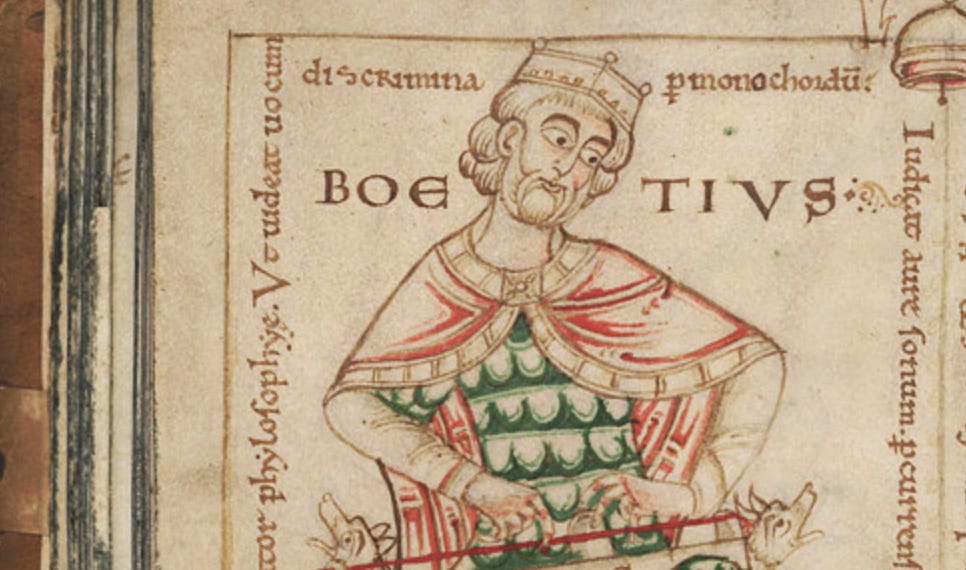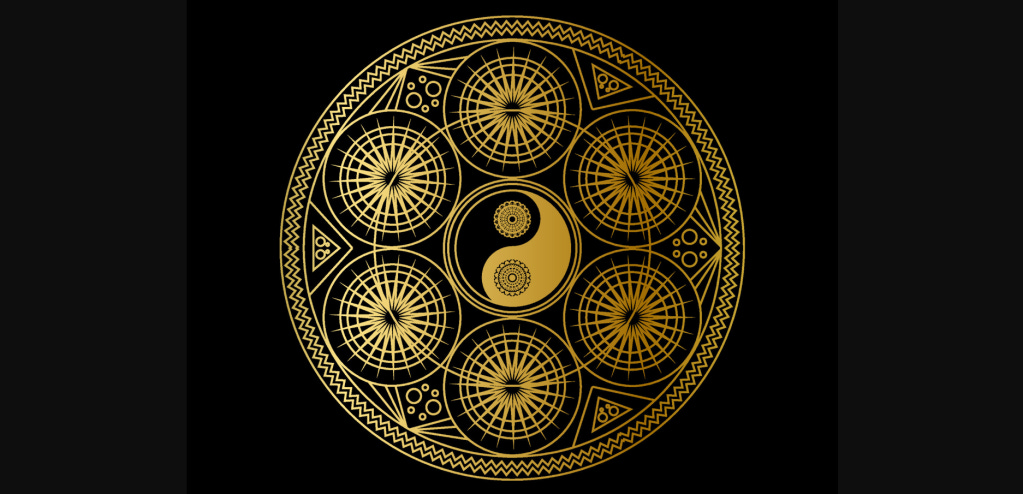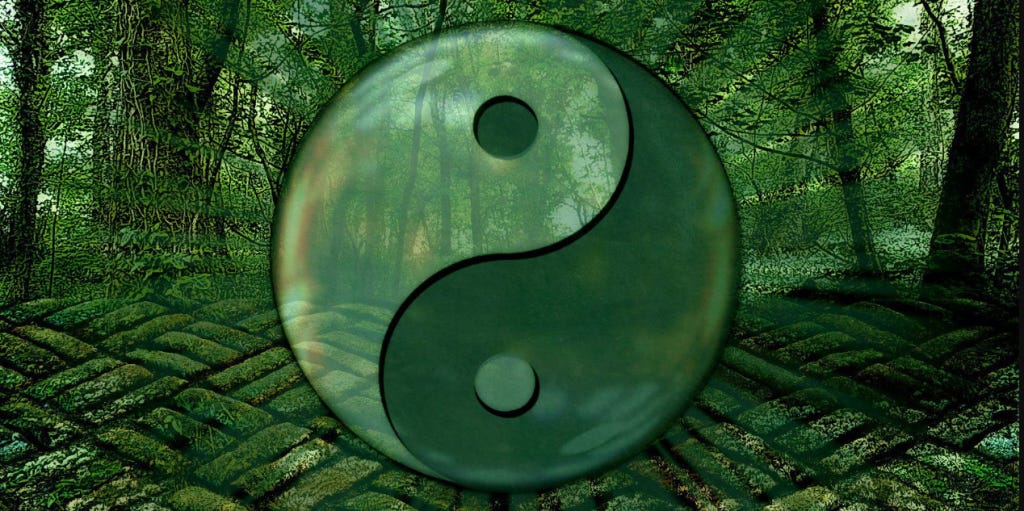Our hearts know things.
Several times in the New Testament, the Apostle Paul states that the natural law is ‘written on the heart.’ That formulation itself is significant in light of the central role of the ‘heart’ in classical psychology as we have explored it in the first two essays of this series.
The idea is that it is somehow innate to us. In the words of the American Declaration of Independence, its propositions are ‘self-evident.’ Nevertheless, there is something of a paradox involved in that our understanding of the natural law can become obscured or distorted. Our conscience may be underdeveloped or warped through prolonged violation.
In The Medieval Mind of C.S. Lewis: How Great Books Shaped a Great Mind (InterVarsity Academic, 2022), Jason M. Baxter asserts that the fifth-sixth century philosopher Boethius was, in his academic work of revealing classical, medieval, and renaissance literature to his students, Lewis’ role model. That fits with Lewis’ self-description of his vocation in his inaugural address at Cambridge we looked at last time. Boethius has been described as the last philosopher of the classical era as well as the first philosopher of the medieval era. He knew his world was coming to a close and set himself the great task of translating the works of Plato and Aristotle into Latin, reconciling their thought, and also reconciling it with Christianity. He achieved only a fraction of this work before being executed. He had held the ancient Roman offices of Senator and Consul, but his actual boss was an Ostrogoth king with whom he fell out and was jailed, tortured, and executed for conspiracy. Yet, while imprisoned, he wrote The Consolation of Philosophy which would be one of the main sources to transmit some of the achievements of classical wisdom to the medieval world. Lewis clearly saw himself as living within new barbaric times. The concept of natural law would be one of the gems of the past he attempted to reinterpret and pass along to those who might rekindle civilization at a future time.
The Tao and the Innovators
In the middle section of The Abolition of Man, C.S. Lewis sets out to define, defend, and illustrate what he calls ‘the Tao’ and which he says “others may call Natural Law or Traditional Morality or the First Principles of Practical Reason or the First Platitudes” (Lewis 1974, 43). He claims that “It is the sole source of all value judgments” and that “There has never been, and never will be, a radically new judgment of value in the history of the world” (Lewis 1974, 43). Those are bold claims.
Attempting to derive a new set of value judgments is what the authors of The Green Book (what Lewis called the primary school textbook that set him to thinking) and what all ‘Innovators’ – as he terms them here – seek to do. He claims that “The practical result of education in the spirit of The Green Book must be the destruction of the society which accepts it” (Lewis 1974, 27). This is really the core of Lewis’ argument, but to see why, we need to unpack what he understands the Tao or Natural Law to be.
We will remember from the previous essay that the authors of The Green Book, whom Lewis dubs Gaius and Titius, had set out to debunk claims of value by arguing that they were not claims about the objective world but merely claims about someone’s subjective feelings. Hence, they represent a species of moral relativism. But, he asserts, “Gaius and Titius have shown by the very act of writing The Green Book that there must be some other values about which they are not subjective at all” (Lewis 1974, 27-28). Why is that exactly? Because they did not write their book debunking customary or traditional moral values to no purpose. They had a purpose and that presupposes they recognized some value which stimulated their action. It’s rather easy to point out the formal logical problems with relativism: the proposition that all truths are relative except the truth that all truths are relative is obviously contradictory. Lewis is pointing out the corresponding problem of practical reason (of how to act): if values aren’t actually valuable, why would you do anything, including writing a book claiming that values merely reflect subjective, emotional states?
Lewis observes that most ‘debunkers’ of ‘traditional morality’ themselves dogmatically hold a set of values that they operate from. If this was true of the ‘progressive’ of Lewis’ era, it is true of the ‘woke’ of our era. Their skepticism towards value is only to be used “on other people’s values” (Lewis 1974, 29).
The reductio
Lewis’ argument proceeds via a series of really rather clever logical moves. He asserts of the values which comprise the Tao: “Unless you accept these without question as being to the world of action what axioms are to the world of theory, you can have no practical principles whatever. You cannot reach them as conclusions: they are premises” (Lewis 1974, 40). He further asserts that the validity of the Tao “cannot be deduced” (Lewis 1974, 83). “If nothing is self-evident, nothing can be proved” (Lewis 1974, 40).
He seems to have several points in mind here. First, he wants to follow traditional thinking that the Tao or Natural Law is given in our nature: it is the law of what is required for human beings to flourish. In this regard, it is a given: it is there and the only question is do we recognize it or not. In this sense it is rather like Pascal’s point when he intoned: “The heart has its reasons, of which reason knows nothing.”
The second point is more complex. Oddly, it seems to me, Lewis accepts the modern ‘fact-value dichotomy.’ This holds that you cannot derive an ought (a value) from an is (a fact). No matter how many scientific facts you stack up, they never tell you what to do. He illustrates this along these lines: science may be able to tell us that if we pursue policy X or Y society will be destroyed and if we pursue policy Z society will be preserved as these are facts. Science can never prove to us that society ought to be preserved. Lewis asserts that for moral reasoning to occur, certain maxims, or axioms, like ‘society ought to be preserved’ have to be accepted (Lewis 1974, 32).
So, as Lewis sees it, anything we might hold as a value is ultimately rooted in the Tao as a moral given. As Michael L. Peterson observes, “The content of the Tao constitutes a framework of value within which distinctively human life flourishes and outside of which it decays and dies” (Peterson 2020, 71).
Hence, when the Innovator sets out to debunk certain values by (at least implicit) appeal to some other values it is a situation of “a rebellion of the branches against the tree” (Lewis 1974, 44). He asserts: “There has never been, and never will be, a radically new judgment of value in the history of the world. What purport to be new systems or (as they now call them) ‘ideologies’, all consist of fragments from the Tao itself…” (Lewis 1974, 43-44). You distort the Tao if you take just one part of it, your totem value, and discount the rest. Human nature is complex and you need to be able to balance one value off against others and ultimately integrate them to achieve actual wisdom.
As a consequence, Lewis asserts that “Only those who are practicing the Tao will understand it” (Lewis, 1974, 49). That is, it is possible for this ancient and universal wisdom to be lost for good if the time should come when everyone has abandoned it. This is another reason education is so important in Lewis’ view: cease to teach it and the knowledge of what it is to be fully human may be extinguished. Theoretically, since it is ‘written on the heart,’ it could always be rediscovered. Why this would no longer hold in our modern world will be the focus of the next essay.
The content of the Tao
As an appendix to the book, Lewis deduces, by surveying world moral teaching, what a sketch of the content of the Tao might look like. He formulates eight meta-laws, many with subdivisions, and then many illustrations. Here is my own summation (quoting Lewis, my insertions are bracketed to illustrate some of the examples he uses, but leaving out all of his actual quotes from pre-modern texts):
The Law of General Beneficence. Negative [do not murder, do not bring misery upon people]. Positive [wish that human society should exist, speak kindness].
The Law of Special Beneficence [brothers should not fight one another, natural affection is a thing according to Nature].
Duties to Parents, Elders, Ancestors [honor your father and mother, give the old person your staff].
Duties to Children and Posterity [Nature produces a love of offspring, the killing of young boys and girls is especially saddening].
The Law of Justice. Sexual Justice [don’t beguile other’s wives]. Honesty [don’t cheat people]. Justice in Court, & C. [don’t take bribes, don’t bear false witness].
The Law of Good Faith and Veracity [don’t lie, don’t commit fraud, the foundation of justice is good faith].
The Law of Mercy [give special regard to the poor and the sick, feed the hungry, have a tender heart].
The Law of Magnanimity (a) [it is unjust to fail to protect those you could have, as you become weaker you will have more need of courage], (b) [choose death before slavery or shame, the soul should lead the body], (c) [the love of wisdom is to practice dying, unless a grain of wheat fall to the ground and die it will bear no fruit] (Lewis 1974, 83-101).
How are we to evaluate if Lewis’ listing does a decent job of articulating the Tao? That is actually rather easy. It is supposed to represent the law of our nature, what moral values we would need to hold to flourish. Lewis had stated this negatively in asserting that a society that adopted a contrary education was destined to self-destruct. So, we can ask: would holding and acting out of these ‘laws’ tend to build a healthy society? Contrariwise, can we imagine a society that is at once healthy and happy and which systematically violates these ‘laws’?
Now we can possibly get a better sense of what Lewis was thinking when he asserted that in trying to introduce a new set of values the Innovator was inevitably taking one value or set of values out of the whole list of valid values and, hence, setting the branches against the trunk. Isn’t that actually the situation of many of our modern values struggles? We like our individual liberty, but don’t want to recognize our duties to others. We like being brash, but don’t want to afford special respect to our parents. On Lewis’ account, one must try to understand as much of the Tao as possible and interpret each value in light of the others. He admits that this sort of internal development of our understanding of the tradition is essential, but rejecting the whole thing or ejecting parts of it (that we don’t like or that don’t seem ‘up to date’) is disastrous.
The post-human option
Startlingly, Lewis asserts his argument so far is valid only against those who are essentially confused about values but who still hold to some guiding set of values. But what about those who would venture to live beyond values? Who will simply exercise power with no attempt at moral justification? Lewis grants they do not act inconsistently:
“Let us decide for ourselves [they say] what man is to be and make him into that: not on any ground of imagined value, but because we want him to be such. Having mastered our environment, let us now master ourselves and choose our own destiny.
“This is a very possible position [Lewis maintains]: and those who hold it cannot be accused of self-contradiction like the half-hearted sceptics who still hope to find ‘real’ values when they have debunked the traditional ones. This is the rejection of the concept of value altogether” (Lewis 1974, 51).
In the next essay, we will look at how Lewis takes up this sort of person who promises the final ‘abolition of Man.’
References
Lewis, C.S., The Abolition of Man, HarperOne, 1974.
Peterson, Michael L., C.S. Lewis and the Christian Worldview, Oxford University Press, 2020.
This essay was first published on Winter Oak.











Cogent discussion of what is sometimes (usually?) obscured in verbiage. Many thanks. Makes his novels even more potent.
Natural law is the behavioural consequence of humans. The law of freedom: an increase in morality creates an increase in freedom.
This can only occur through knowledge of what objective morality is.
This is the occulted secret that keeps us as slaves.